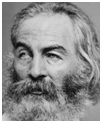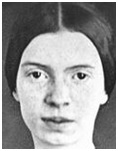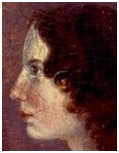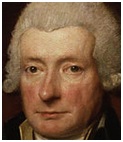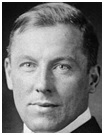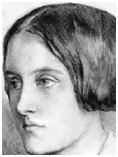|
 |
|
 |
Poetry - God and Religion
Walt Whitman (1819-92), Song of Myself (in Leaves of Grass,
1855) The American poet (pictured right) sees God in nature, people and their good deeds based on self-reliance and compassion:
And nothing, not God, is greater to one than one’s self is, And whoever walks a furlong without sympathy walks to his own funeral drest in his shroud.
William Blake (1757-1827),The Divine
Image (1789) The English poet (pictured right) sees God in virtue:
Where Mercy, Love and Pity dwell, There God is dwelling too. (last two lines).
William Blake,The Lamb (1789) In this poem Blake praises God for creating a lamb and Jesus (known as the “Lamb” of God ) who is “meek” and “mild” - see lines 4 and 5 of the second verse.
Little Lamb who made thee Dost thou know who made thee Gave thee life & bid thee feed. By the stream & o’er the mead; Gave thee clothing of delight, Softest clothing wooly bright; Gave thee such a tender voice, Making all the vales rejoice! Little Lamb who made thee Dost thou know who made thee
Little Lamb I’ll tell thee, Little Lamb I’ll tell thee! He is called by thy name, For he calls himself a Lamb: He is meek and he is mild, He became a little child: I a child and thou a lamb, We are called by his name. Little Lamb God bless thee. Little Lamb God bless thee (complete poem)
Emily Dickinson
(1830-86), Faith is a fine invention (1860) The American poet (pictured right) says that wisdom is a mixture of faith in God and scientific knowledge and inquiry:
Faith is a fine invention For gentlemen who see; But microscopes are prudent In an emergency! (complete poem)
Mary Stevenson (1922-99), Footprints In the Sand (1936) In this Christian poem (also called Footprints) by the American poet (pictured right), God promises to help and follow you everywhere (resulting in two sets of footprints in the sand). But there is only one set of footprints at the times of greatest difficulty. God explains why at the end of the poem:
The times when you have seen only one set of footprints Is when I carried you.
Emily Brontë
(1818-48), No Coward Soul Is Mine (1848) The English author of Wuthering Heights (pictured right) says that faith in God gives you moral courage and freedom from fear:
No coward soul is mine, No trembler in the world's storm-troubled sphere: I see Heaven's glories shine, And faith shines equal, arming me from fear. (first verse)
Prayer of St Ignatius of Loyola
(1491-1556) The Spanish founder of the Jesuits (pictured right) wrote this prayer: Dearest Lord, teach me to be generous. Teach me to serve you as you deserve; to give and not to count the cost; to fight, and not to heed the wounds; to labor, and not to seek to rest; to give of myself and not to ask for reward, except the reward of knowing that I am doing your will.
Prayer of St. Francis A Roman Catholic prayer but not written by St. Francis of Assisi (pictured right)!
Lord, make me an instrument of Your peace; Where there is hatred, let me sow love; Where there is injury, pardon; Where there is error, truth; Where there is doubt, faith; Where there is despair, hope; Where there is darkness, light; And where there is sadness, joy.
O Divine Master, Grant that I may not so much seek To be consoled as to console; To be understood as to understand; To be loved as to love. For it is in giving that we receive; It is in pardoning that we are pardoned; And it is in dying that we are born to eternal life.
Henry F. Lyte (1793- 1847), Abide With Me
(1847) In this hymn Lyte's (pictured right) lyrics show how God can help in times of uncertainty and change:
Abide with me; fast falls the eventide; the darkness deepens; Lord, with me abide. When other helpers fail and comforts flee, Help of the helpless, O abide with me.
Swift to its close ebbs out life's little day; earth's joys grow dim; its glories pass away; change and decay in all around I see; O thou who changest not, abide with me. (first two verses)
William Cowper, God Moves in a Mysterious Way
(1774)
The English poet's (pictured right) hymn describes how God's wisdom and power can be revealed by critical thinking ( “blind unbelief is sure to err” , last verse):
God moves in a mysterious way His wonders to perform; He plants His footsteps in the sea And rides upon the storm.
Blind unbelief is sure to err And scan His work in vain; God is His own interpreter, And He will make it plain. (first and last verse)
Robert Service (1874-1958), Pragmatic (1955) The Canadian poet (pictured right) describes his conversion to Christianity because “it works” (last line):
When young I was an Atheist, Yea, pompous as a pigeon No opportunity I missed To satirize religion. I sneered at Scripture, scoffed at Faith, I blasphemed at believers: Said I: "There's nothing after Death,- Your priests are just deceivers.
Now I am old, with steps inclined To hesitate and falter; I find I get such peace of mind Just sitting by an altar. So Friends, don't scorn the family pew, The preachments of the kirks: Religion may be false or true, But by the Lord!- it works". (first and last verses)
John Newton (1725-87), Amazing Grace The Englishman's (pictured right) hymn praises God for forgiving him (he had previously supported slavery):
Amazing grace! (how sweet the sound!) That sav'd a wretch like me! I once was lost, but now am found; Was blind, but now I see. (first verse)
William Blake (1757-1827), The Chimney Sweeper (1794)
Blake (pictured right) attacks the hypocrisy of the church going parents of a boy chimney sweeper:
They clothed me in the clothes of death, And taught me to sing the notes of woe. And because I am happy and dance and sing, They think they have done me no injury, And are gone to praise God and His priest and king, Who made up a heaven of our misery. (last six lines)
Helen Steiner Rice (1900-81), This Too Shall
Pass The American poet (pictured right) says religion can help you solve life's problems:
Then nothing in life can defeat me For as long as this knowledge remains I can suffer whatever is happening For I know God will break all of the chains (fourth verse)
Christina Rossetti (1830-94), In the Bleak Mid Winter
(1872) The English poet's (pictured right) poem and Christmas carol says that all God wants is to give Him your heart (last line):
What can I give Him, poor as I am? If I were a shepherd, I would bring a lamb; If I were a Wise Man, I would do my part; Yet what I can I give Him: give my heart. (last verse)
In another poem, A Better Resurrection, Rossetti describes how Jesus can save us from sin:
My life is like a broken bowl, A broken bowl that cannot hold One drop of water for my soul Or cordial in the searching cold; Cast in the fire the perished thing; Melt and remould it, till it be A royal cup for Him, my King: O Jesus, drink of me. (last verse) |
|
|
||
|
|
|
||
|
||
| Copyright © wisdomtowin.com All Rights Reserved | ||
|

